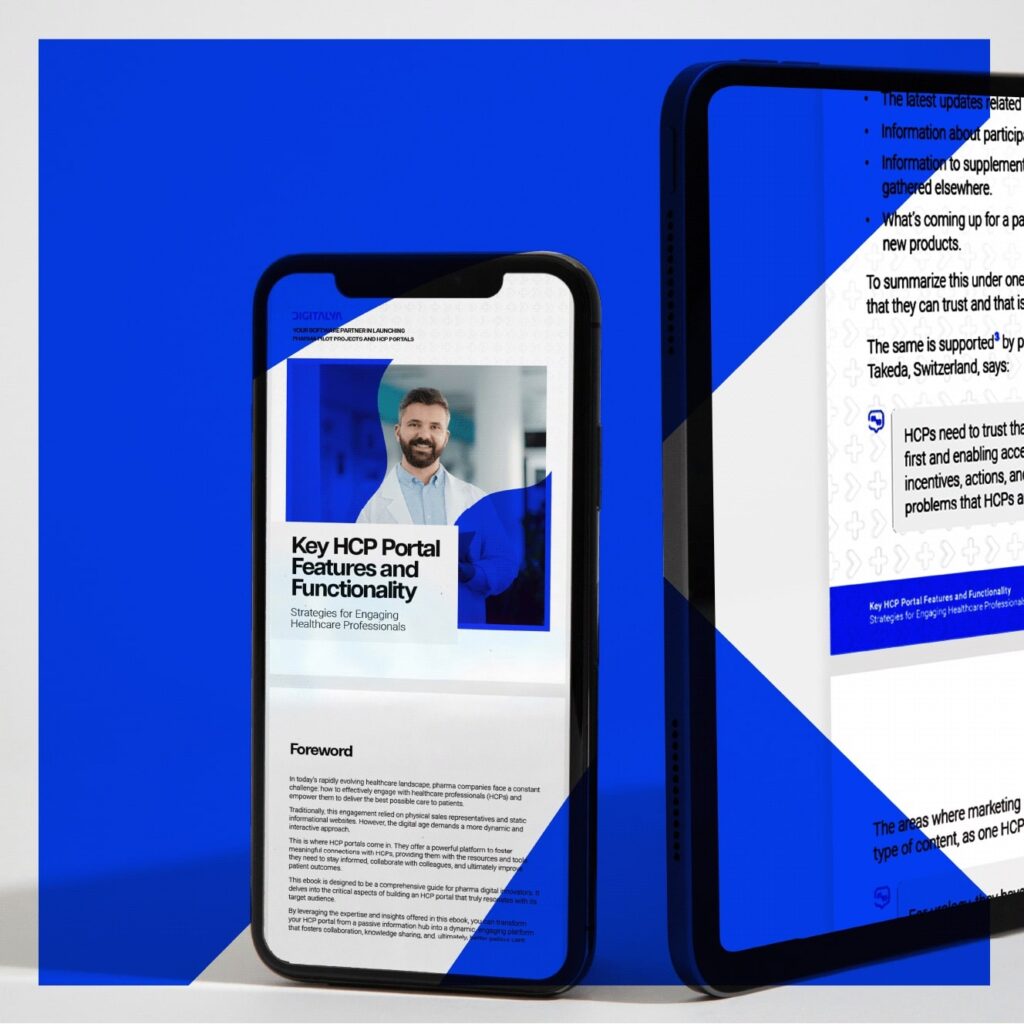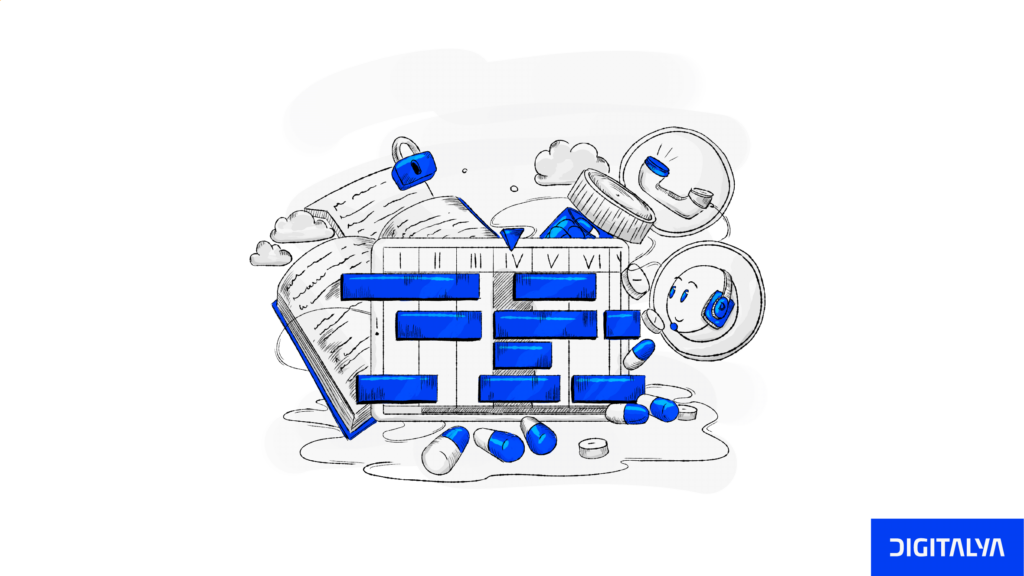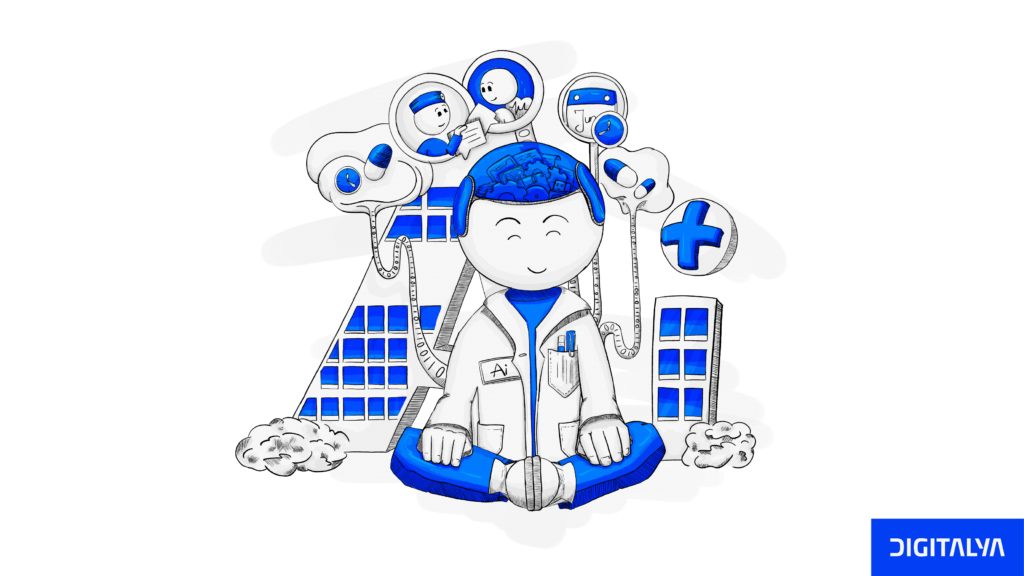Startups must make an effort for the digitalization of their processes to keep up with the competition. When we talk about digital transformation, we automatically consider technology because, as a startup, you are expected to be innovative, use the best technology platforms, offer top-notch services, and differentiate yourself.
So what can you do? Where can you start?
A simple answer is: to study the tech platforms available in today’s market to strategize and be wise on what tools and systems you’ll build or buy for your company.
But don’t worry because we are saving you the trouble of spending numerous hours on research, as we’ve summarized key aspects you can follow to select the best technology platforms for your startup. Let’s dig in!
1. What is a technological platform?
Have you noticed how social media networks like Instagram or Twitter are now called platforms? Even TikTok, AirBnB, and Uber qualify as platforms, but what does a platform even mean, and what do all these businesses have in common?
From a technical perspective, a “platform” initially meant the foundation that supports the software. Now, it has a more complex definition, meaning that it serves as the base for the development and support of hardware and software. Over the years, platforms have become some of the most dynamic, innovative, and fastest-growing services.
So all the brands mentioned above have in common this environment for building and running apps, processes, and systems.
For a more complex understanding of this concept, Webopedia explains that:
“a platform can be defined as a hardware or software architecture that acts as a basic structure upon which applications, processes, and technologies are developed and run to enable business or work outcomes. A platform can also host an application or a service. Typically, a software platform supports many programming languages, engines, and web services and is also represented as a framework.”
2. What are some examples of technological platforms?
Let’s start with a clear example: personal computers. The platform, in this case, is the PC’s operating system which manages the computer’s memory and processes. It’s also the lowest level of a platform. The operating system is in charge of the PC’s resources and services that will be needed by applications, as well as all of the hardware and software.
There are many types of platforms, but the most common tech ones are listed below:
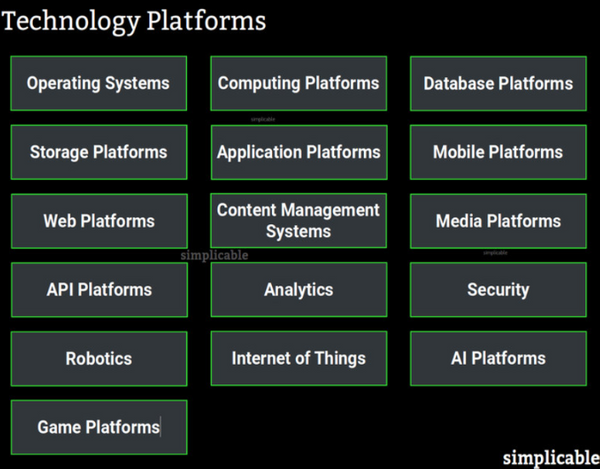
Furthermore, we’ll learn more about computing, database, mobile applications, API, and Artificial Intelligence Platforms.
- Computing Platforms – also known as digital platforms, are environments where a piece of software is executed. They are built on top of operating systems that offer computing functionality for fields like virtualization or cloud computing.
- Database Platforms – Put simply, it’s data that comes manually or automatically (typical for smart devices)and is stored somewhere inside a database on a cloud. View it as the software that stores a collection of information of almost any type organized so that it can be accessed, managed, and updated either by other programs or by users directly. Many organizations favor it because it requires an integrated set of technologies to meet various business needs. It allows the acquisition, preparation, storage, delivery, and governance of data, including a security layer for users and applications.
On the other hand, a data management platform (DMP) is a software tool that manages the data and includes a graphical interface. It houses valuable digital input like customer data (e.g. cookie IDs, mobile identifiers) and campaign data, enabling users to manage a database easily.
It is a managing platform that is favored by the digital marketing sector, more precisely marketing and sales, as it helps these departments put together a business strategy ensuring sustainable development.
To keep in mind: if you are interested in learning a management system, we recommend our case study about SEDUCO.
- Mobile platforms – include mobile operating systems and environments for creating mobile apps. They also target cloud platforms designed for mobile device backends and may include specialized APIs for mobile app developers. Some examples of mobile platforms include iPhone, Palm, BlackBerry, Android, and Windows Mobile.
- Application Platforms – these are frameworks of services that application programs rely on for standard operations. It is designed for the app development process, and you can view them as environments that include a set of tools for the deployment, design, and development of apps.
- API Platforms – they have the purpose of serving application development — building new capabilities, new experiences, fostering ecosystems, and more. You might come across the term API platform synonymous with API Management, Full Lifecycle API Management. It is also a cloud platform that performs load balancing, rate limiting, and latency reduction functions.
- AI Platforms (also called machine learning platforms) – require machines to carry out tasks that human beings would perform. These platforms activate the cognitive function associated with the human mind, performing actions like problem-solving, reasoning, learning, social intelligence, and general intelligence. It’s worth mentioning that the powerful integration of artificial intelligence (AI) frameworks, like natural language processing and automated predictive insights, is transforming what business intelligence can do for businesses. So, artificial intelligence, virtual reality, and advanced algorithms are all no longer a fantasy from a science fiction movie. They are here and ready to use.
3. Best technology platforms for startups
Selecting a cloud platform over others is not simple, and it will come down to the wants and needs of your organization. Luckily, we’ve done our research, and we are providing a list of the best five tech platforms that are ideal for startups. This will help you strategize the use of technology based on your own requirements and end goals.
It offers various computing services, including cost management, web and video delivery over the web, data management, and AI and machine learning tools. It is popular because it offers a top security model based on 15 years of experience and a global network that allows quick user collaboration. Overall, it is a collection of Google’s computing, networking, machine learning, storage, big data, and management services that run on the same Cloud infrastructure that Google operates internally for its end-user products i.e., Google Search, YouTube, Gmail, and Google.
This is a global platform that has the largest and most dynamic community. It has millions of active customers and tens of thousands of partners globally. It’s a top choice for many organizations because of the variety of services it includes and because it has proved to be a reliable vendor over the years. It’s easy to use, secure, and flexible, and you can select the operating system, web application platform, programming language, database, and other services you desire.
It offers the best price/performance in the market to date. Workloads deployed on this platform often need fewer cloud-computing servers and block-storage volumes. This diminishes the cost of delivering optimized workload performance. It is preferred by so many because of its very good audit management, easy data analytics, and data scanning. Also, you can manage and scale down networks across your company while the platform remains stable and easy to use.
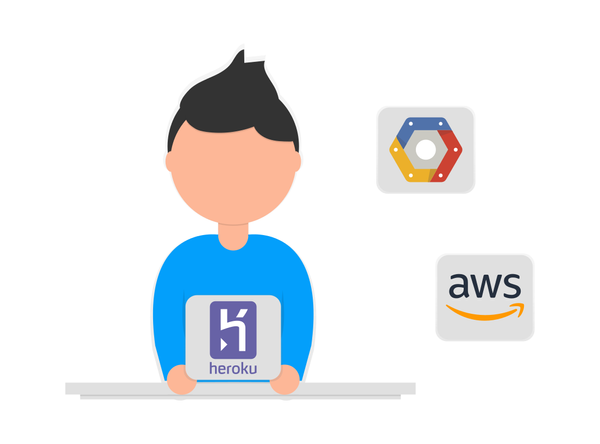
It is preferred over other operating systems because it is robust, easy to manage and administer, with rock-solid stability and minimal performance issues, and server reboots. Security-wise, they are strong as they use kernel-level technology to prevent all known symbolic link attacks, enhancing the security level of the servers. It also allows you to tailor the system and support subscription plans according to the customer’s demands.
It is a developer-friendly infrastructure platform making the software engineers’ jobs easier regarding building management services. You can accurately predict your costs, scaling up or down as the traffic grows. Also, it is endorsed by 598k customers worldwide, and it is popular because it provides its users with the right set of tools to operate a SaaS business profitably. Also, the integration and provision of Kubernetes are seamless, and you can design robust applications using a comprehensive portfolio of computing, storage, database, and networking products.
Around 90% of Fortune 500 companies use Azure to run their business. It is preferred by many because it supports a wide range of programming languages, operating systems, databases, frameworks, and devices, enabling companies to benefit from tools and technologies they’ve come to trust. You can enjoy an Azure free account for 12 months to test what works for you and your needs. You can build and deploy modern apps using serverless containers. Also, you can enjoy a fast NoSQL database with open APIs for any scale.
4. Bonus: Software platforms to accelerate your startup’s growth
4.1 Analytics
It is trusted by 6,000+ paying customers and serves over 26,000 companies from different industries worldwide, including Uber, Expedia, DocuSign, and Lemonade. This analytical platform helps companies measure what matters to them, make decisions fast, comprehend the network effects, and build better products through data. Also, it has a short learning curve, it’s useful for driving product adoption, boosting acquisition, reducing churn, and improving profitability. It’s useful for making smarter, faster supply chain decisions by spotting anomalies and their causes.
It is advertised as an all-in-one analytics app because it helps you understand website traffic, user behavior, customer needs as well as feedback. It includes everything you need as a website owner to track and analyze your statistics and visitors in one application. It’s also practical for business modeling to explore a range of decisions and to identify the essential elements that drive business.
4.2 Project management
Asana is a work manager used in project management that helps teams orchestrate their work, from small projects to strategic initiatives. It has over 93,000 paying customers and over 1.5 million paid users. With Asana, you can create a standard work intake process using Forms and get the details your team needs upfront, promptly routing requests in real time. It’s easy to use, with a generous free plan and includes tons of features & hundreds of integrations.
It is considered the number one software development tool preferred by agile teams. It tracks members, it’s made for planning and building great products. Thousands of teams use it to capture and organize issues, assign work, and follow team activity. Also, you can connect Jira to an external user management system, and you can also use it as a user management system for other Atlassian products.
4.3 Automation
It is an automation tool that helps you automate repetitive tasks between two or more apps without needing code. If you use a wide range of business and productivity apps, Zapier is the platform that helps you connect them all. It is user-friendly, it offers a wide range of integrations available for various business needs, and through automation, you save time and remove human error.
4.4 CRM
Regarding email marketing, Mailerlite is an easy, effective, free email newsletter software that does the job. You can enjoy their good free plan, but even on paid plans, it is cheaper than competitors like Mailchimp. It’s easy to use and set up, with great features like creating email campaigns, A/B split testing, marketing automation, and audience segmentation, as well as great 24/7 support.
It is considered one of the top CRM platforms for two reasons. One: it has an excellent comprehensive free edition that surpasses most paid CRMs on the market. And two: you can use it across your marketing, sales, and customer service teams. Additionally, you’ll enjoy full visibility into your sales pipeline in real time.
4.5 Customer happiness
This platform has become a success because it is the first customer experience management platform for B2B digital agencies that utilize AI to measure client happiness in real time. What’s nice, according to Agency Spotter, is that the tool provides:
“personality insights based on written communication and business bits of advice based on the NPS level on which the client is on. The platform generates personised profiles for each customer while being 100% GDPR compliant…”
5. Conclusion
There’s no doubt that technology platforms play a crucial part in business operations. Without a thorough understanding of your needs and what differentiates your business, you can make the wrong decisions that would make technology a liability and not an asset. We hope that through this article, you’ll learn valuable information about using the technology at hand, what brands to choose, and how to opt for the right platforms to scale your startup.

